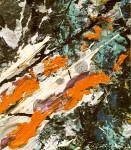Tuesday, August 29, 2006
shoftim: who are the prophets in our midst today?
a dvar torah that i wrote for this past shabbat:
In an era of hurricanes, wars, melting glaciers, explosive bottles of gatorade and slithering snakes on a plane, how do we distinguish fact from fiction – truth from static - the real threats from Hollywood’s imagination and pre-election manipulations? To whose voice do we listen - Samuel L. Jackson, Al Gore, Jon Stewart or Tony Snow? Who are the true prophets in our midst today?
Conveniently enough, in this week’s Torah portion (Chapter 18 of Deuteronomy), God actually explains the way that prophesy is ideally supposed to work. God spoke to Moses, saying …18 I will raise up a prophet for them from among their own people, like [Moses]: I will put My words in [the prophet’s] mouth and he will speak to [the people] all that I command him; 19 and if anybody fails to heed the words that he speaks in My name, I Myself will call him to account…
So now, basically, then if the prophet’s words do come true, he was a true prophet, and was recanting an oracle directly from God. But, if the prophet’s words don’t come true, he was, therefore, a false prophet, and was apparently speaking presumptuously.
21And should you ask yourselves, "How would we know if an oracle was not spoken by the Lord?" — 22 if the prophet claims to speak in the name of the Lord but then his oracle does not come true, that oracle was not spoken by the Lord; the prophet has uttered it presumptuously: do not stand in dread of him.”
If his words come true, he’s a prophet --- if they don’t, he’s a fraud.
Ok, I can sort of see that… but now then, wait a second, there’s at least one potential flaw in that logic. Can anyone think of it?
Well, if you can, then you’re in good company. Every Yom Kippur afternoon we read the story of Jonah, the prophet who was a little too smart for his own good, the famous thorn in the side of Adonai.
The Book of Jonah asks us to ponder the question of how long we have to wait, to find out if the prophet was indeed channeling the word of God. Because, what happens if the prophet accurately rants and raves, but then the people repent, and the doom and gloom never actually transpires. Aha – the famous prophetic loophole."The word of the LORD came to Jonah son of Amittai: “Go at once to Nineveh, and proclaim judgment upon it; for their wickedness has come before Me.”
This is presumably because Jonah fears that his prophetic reputation is now ruined; he’s like the boy who cried wolf. He’s afraid that no one will ever believe his prophetic wisdom ever again. Such is his prophetic paradox.
Jonah, however, started out to flee to Tarshish from the LORD'S service. He went down to Joppa and found a ship going to Tarshish. He paid the fare and went aboard to sail with the others to Tarshish, away from the service of the LORD
The word of the LORD came to Jonah a second time: “Go at once to Nineveh, and proclaim to it what I tell you.”
Jonah went at once to Nineveh in accordance with the LORD'S command … he made his way into the city … and proclaimed: “Forty days more, and Nineveh shall be overthrown!”
The people of Nineveh then believed God. They proclaimed a fast, and great and small alike put on sackcloth. When the news reached the king of Nineveh, he rose from his throne, took off his robe, put on sackcloth, and sat in ashes. And then he had the following proclaimed throughout Nineveh: “By decree of the king and his nobles: No man or beast shall taste anything! They shall not graze, and they shall not drink water! They shall be covered with sackcloth – both man and beast - and shall cry mightily to God. Let everyone turn back from his evil ways and from the injustice of which he is guilty. Who knows but that God may turn and relent? He may turn back from His wrath, so that we do not perish.”
God saw what they did, how they were turning back from their evil ways. And God renounced the punishment that He had planned to bring upon them, and did not carry it out. This displeased Jonah greatly, and he was grieved. He prayed to the LORD, saying, "O LORD! Isn't this just what I said when I was still in my own country? That is why I fled beforehand to Tarshish …. Please, LORD, take my life, for I would rather die than live.”
Jonah reminds me of Cassandra from Greek mythology:Cassandra had been the youngest daughter of the last King of Troy. Apollo fell in love with her. To win her affections, he made a proposal: If she agreed to love him, he would give her the gift of prophecy.
And what about today? What prophetic wisdom have we recently seen? Who are the present-day Jonahs and Cassandras in our society?
Cassandra accepted, and she was given the ability to see the future. But she could not bring herself to love Apollo. Apollo was outraged. He begged her for a single kiss, and she consented. When their lips touched, Apollo breathed into Cassandra’s mouth in such a way that no one would ever believe her prophecies.
Cassandra was thus doomed to a life of despair. She could see the dangers threatening others, but she could not prevent them. Cassandra warned the Trojans that the Greeks were about to attack, and she cried out to warn them that soldiers were hidden inside the Trojan Horse. But her warnings went unheeded. Troy collapsed under the Greek onslaught …
We remember that on August 6, 2001, President Bush’s daily brief contained a two-page section entitled "Bin Ladin Determined to Strike in US.” As we also prepare to remember the one-year anniversary of Hurricane Katrina on Tuesday, I want to read a few passages from a series that the New Orleans Times Picayune newspaper published in October 2002, entitled “Washing Away,” looking at the potential danger from a Hurricane hitting the Big Easy…"A catastrophic hurricane represents 10 or 15 atomic bombs in terms of the energy it releases," said Joseph Suhayda, a Louisiana State University engineer who is studying ways to limit hurricane damage in the New Orleans area. "Think about it. New York lost two big buildings. Multiply that by 10 or 20 or 30 in the area impacted and the people lost, and we know what could happen."
And that’s exactly what happened…. I got chills reading these eerily prophetic articles online. Was this wisdom carelessly ignored, or am I falling into the trap of typical Monday-morning quarterbacking? History will be our judge.
Hundreds of thousands would be left homeless, and it would take months to dry out the area and begin to make it livable. But there wouldn't be much for residents to come home to. The local economy would be in ruins.
"Evacuation is what’s necessary: evacuation, evacuation, evacuation," Jefferson Parish Emergency Preparedness Director Walter Maestri said. "We anticipate that (even) with refuges of last resort in place, some 5 to 10 percent of the individuals who remain in the face of catastrophic storms are going to lose their lives."
"Another scenario is that some part of the levee would fail," Suhayda said. "It's not something that's expected. But erosion occurs, and as levees broke, the break will get wider and wider. The water will flow through the city and stop only when it reaches the next higher thing. The most continuous barrier is the south levee, along the river. That's 25 feet high, so you'll see the water pile up on the river levee."
Christian theologian Walter Brueggemann, writes that one of the prophet’s tasks is“…to bring to public expression those very fears and terrors that have been denied so long and suppressed so deeply that we do not know they are there. . . The prophet must speak evocatively to bring to the community the fear and the pain that individual persons want so desperately to share and to own, but are not permitted to do so. . . .
The prophet’s job is to announce that the Emperor has no clothes, regardless if the Emperor preemptively decides to get dressed. Davka, he should get dressed, that’s the whole point.
The prophet does not scold or reprimand … It is the task of the prophet to invite the king to experience what he must experience, what he most needs to experience and what he most fears to experience, namely, that the end of the royal fantasy is very near. The end of the royal fantasy will permit a glimpse of the True King who is no fantasy. But we cannot see the real king until the fantasy is shown to be a fragile and perishing deception.”
In an account described in the book of Numbers (chapter 11), Eldad and Meidad, two Israelite elders began to “act the prophet” in the camp, speaking in ecstasy, and doing other things that seemed upsetting to Joshua ben Nun, Moses’ attendant from his youth. Moses, though, instead of restraining them, as was Joshua’s request, exclaimed:“Would that all the Lord's people were prophets, that the Lord put His spirit upon them!”
Would that all of us were prophets, that God’s spirit be upon us…. May God’s spirit be upon us, as we continue to develop our individual and communal prophetic voice. May this spirit of Divine wisdom guide us to better discern the true prophets from everything else that fights for our attention, amid all of the clutter of our day to day lives. May this be Your will. Ken Y’hi Ratzon. Shabbat Shalom.

